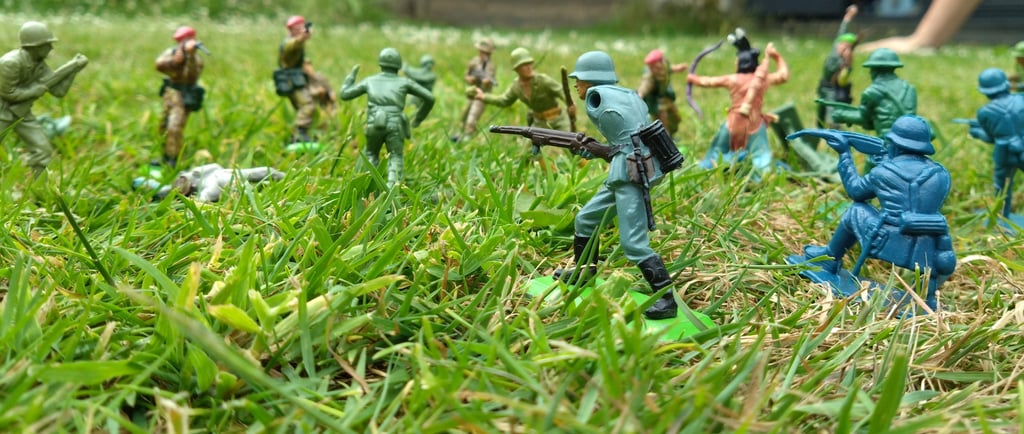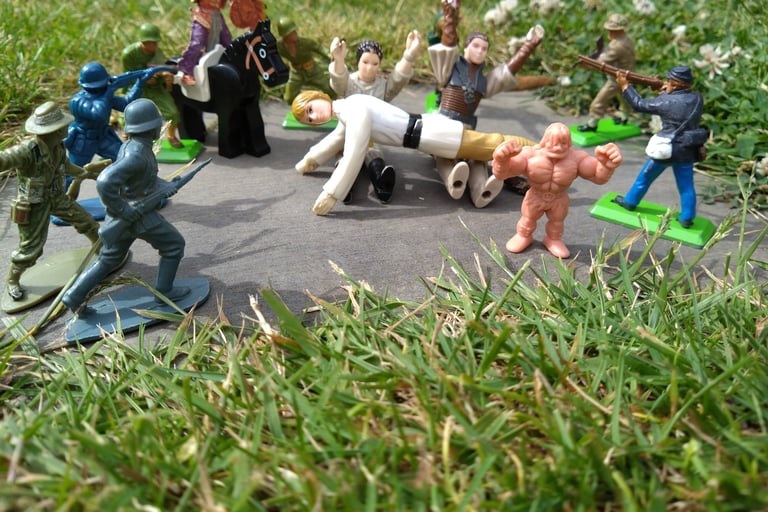Book Review - War in Context
The Carter Review of 'War in Context - Making Sense of War by Christopher K Pike
Paul Carter
7/1/20254 min read


While reading War in Context – Making Sense of War, I remembered a line from the Kermode and Mayo interview with the filmmakers of Warfare, the visceral, real-time depiction of a Navy SEALs operation in Iraq in 2006. The former SEAL and co-director Ray Mendoza responded to the consensus that it was incredibly authentic by asking: ‘How do you know it is authentic?’
Warfare is now on Amazon Prime. I could be watching it now but I want to write this book review without distraction. I have never been in the Armed Forces, not even the cadets, but it’s not just armies that fight wars, countries do and the author Christopher Pike understands this. ‘It is often claimed that wars in the future will be fought by cyborgs, artificial intelligence and autonomous armed vehicles. This may well be true for what we call warfare, but war itself will always be an intensely human and political preoccupation.’
In terms of style, this book is not vivid journalism like Mark Bowman’s Black Hawk Down or historical reportage like the books by Max Hastings and George Cornwell. It is written like a business book which reflects the author’s multidisciplinary background in engineering and business administration, equipping him with a systematic, evidence-driven approach to military analysis.
I am a civil servant with experience in crisis command, trauma management, intelligence and business partnering. I feel at home with this book as I can imagine a Ministry of Defence official with a passion for anthropology and geopolitics writing it in between policy briefings and a finance qualification he was always too busy to finish.
Putting warfare into context includes comparisons between humans and chimpanzees in our shared appetite for violence. There are tributes to Ancient Rome, Sun Zsu, The Prince by Machiavelli and why military strategy should be a continuous preoccupation rather than the occasional distraction. This approach aligns with the espionage and conflict podcasts I have been listening to as ‘strategy generally needs to consider what the new balance between the protagonists might be after the hostilities have ended.’
‘If military force is simply about victory rather than peace and a better political balance, it is simply gratuitous violence. There has to be some overriding objective. War is not just a continuation of politics by other means. Even in defence and wars of national salvation, the goal of workable political balance between attacker and defender and the eventual emergence of durable peace must be kept in mind. Humiliation of an opponent or an enforced armistice will scupper peace in the long term. War must be used instrumentally, to achieve political effect.’
Reading this book can help you put the UK government’s Strategic Defence Review into context - The Strategic Defence Review 2025 - Making Britain Safer: secure at home, strong abroad and consider that half of Britons ‘would not fight for their country under any circumstances today’.
‘It might be tempting to think that we no longer need military power or that we don't need quite so much first though we have to consider the changing character of warfare in this relationship to war itself,’ writes the author. That might be why the defence budget is increasing to 5%. The UK is moving to warfighting readiness— establishing a more lethal ‘integrated force’ equipped for the future, and strengthened homeland defence, according to the Strategic Defence Review
The chapter ‘Can the United Kingdom defend itself?’ starts with a flat no to answer that question. This is concerning, making me wonder if missiles could strike our island. Like other articles and books I have read on this topic, it unpicks the “one for all and all for one” promise of NATO’s Article 5 treaty. ‘To put it bluntly, would British parents be happy seeing their sons and daughters die defending Bulgaria?’ is a question that might be waiting for an answer.
I wish that British service personnel contributed to the book with some macho threats to make enemies quake in their boots. Unfortunately it does not. Instead it quotes General Sir Richard Barrons: ‘The army is not equipped to fight a rival professional land force and is significantly outgunned by Russia, whose conventional weaponry is impressive.’
But other commentators have criticised Russia’s military efforts in its invasion of Ukraine and its GDP and economic status. What to believe? The first casualty of war is the truth. But Russia doesn’t play fair and this is the second time in a week I have read that Russia doesn’t have to shoot down our fighter jets, just murder the pilots while they sleep safely in their beds.
The author does not glamorise war and wants the reader to understand the political front of warfare. The scepticism of governments learning lessons from previous defence strategies and policies would attract nodding heads. I have learned the difference between kinetic combat which involves the use of physical force and non-kinetic combat which does not directly involve physical force, such as cyberattacks, information warfare or economic sanctions to weaken or influence an adversary.
I folded lots of pages and am running out of space to include those excerpts. I found the terrorism section fascinating. ‘Terrorists from a western, supposedly Christian background are not called ‘Christian terrorists’, and neither should terrorists who happen to be Muslims be identified as Islamic terrorists.’ This is not an anti-West diatribe by “radical left lunatics”. The research into international wars and cross-border and cross-culture conflict is evident. I want to know more about counter insurgency and what the difference is between liberal internationalism and liberal interventionism.
This book emphasises the importance of diplomacy, policies and strategic deterrence, including this quote from Professor Sir Lawrence Freedman: ‘Deterrence can be a technique, doctrine and a state of mind. In all cases it is about setting boundaries for actions and establishing risks associated with crossing those boundaries.’ War does mirror real life!
There is wargaming, drones, journalism, cyber warfare, military expenditure, the business of war, pacifism, religion and what Germany does next in a changing world order.
The book reminded me of a David Attenborough wildlife documentary which looks at everything wrong with the world and our doomed future unless we find a way to achieve world peace. But life isn’t a beauty queen pageant and history suggests there will always be war.
We can only hope that we will not experience the brutal authenticity of warfare. Sing that on your Glastonbury stage.


Inspiration
What we talk about when we are working and living
© 2025. All rights reserved.
